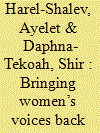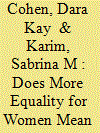| Srl | Item |
| 1 |
ID:
146237


|
|
|
|
|
| Summary/Abstract |
In exploring wars and conflicts, Critical Security Studies and Feminist International Relations (IR) use various methodologies, including nontraditional avenues of inquiry. This study follows these theoretical and methodological perspectives and suggests a methodology that will contribute to contemporary debates in IR. Specifically, the study offers an innovative application of Carol Gilligan’s method, the “Listening Guide” (LG). The research demonstrates the utility of the LG analysis in uncovering additional forms of knowledge regarding armed conflicts. The context for analysis is women in combat. The implementation of the LG assists us in uncovering various voices, representing different aspects of the women combatants’ experiences in a conflict zone. In this study, this analytical tool, applied to conduct narrative research, enabled the researchers to hear both multiple and silenced voices. We suggest that this methodology should continue to be used in future studies and incorporated into the Security Studies and IR toolkit.
|
|
|
|
|
|
|
|
|
|
|
|
|
|
|
|
| 2 |
ID:
186191


|
|
|
|
|
| Summary/Abstract |
Recent world events, such as the rise of hypermasculine authoritarian leaders, have shown the importance of both sex and gender for understanding international politics. However, quantitative researchers of conflict have long relegated the study of sex and gender inequality as a cause of war to a specialized group of scholars, despite overwhelming evidence that the connections are profound and consequential. In this review essay, we demonstrate the tremendous progress made in this field by analyzing a wave of research that examines the relationships between sex and gender inequality and war. We divide this work into theories that emphasize strategy versus those that analyze structures. In addition, we focus on two aspects of this research agenda—specifying mechanisms that link sex and gender inequality to war, and leveraging data at multiple levels of analysis—to outline fruitful pathways forward for the broader international security research agenda. Ultimately, we argue that the study of the nexus of sex and gender inequality and war will enliven theoretical debates, illuminate new hypotheses, and enrich the policy discourse with robust evidence.
|
|
|
|
|
|
|
|
|
|
|
|
|
|
|
|
| 3 |
ID:
083578


|
|
|
|
|
| Publication |
2008.
|
| Summary/Abstract |
argue that gender mainstreaming across varied policy contexts may help to transform the 'inferior' status allocated to feminist international relations (IR) in relation to mainstream (masculinist) IR. I begin by outlining the problem of this inferior status, explaining the historical background to it and reasons for its perpetuation. I then explain gender mainstreaming developments and diverse ways in which they illustrate the importance of gender, including for our understanding of power and inequality. I pose questions about whether these developments and the policy practices related to them can raise consciousness in the wider IR discipline about the nature of feminist IR, and its contribution as an inclusive approach to humanity, focusing on both men and women and relations among and between them. I argue that gender mainstreaming policies related to the core IR area of human security and violence are a key challenge to the constraints of masculinist IR. I conclude that gender mainstreaming could be a site of new conversations and understanding between feminist IR and mainstream IR
|
|
|
|
|
|
|
|
|
|
|
|
|
|
|
|